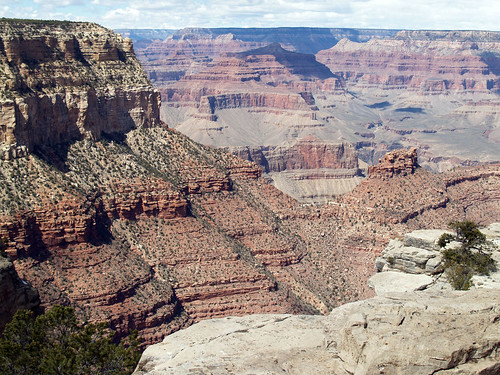Geology Career Potential
What do geoscientists do?
Geoscientists make invaluable contributions to human welfare and to the advancement of scientific knowledge by:
- Analyzing and predicting the behavior of Earth's tectonic, atmospheric and oceanic systems.
- Finding adequate supplies of natural resources, such as groundwater, petroleum, metals, gemstones and building materials.
- Conserving soils and maintaining agricultural productivity.
- Developing natural resources in ways that safeguard the environment.
- Maintaining the quality of water supplies by locating and evaluating subsurface contamination and cleaning up polluted groundwater.
- Reducing human suffering and property loss from natural hazards, such as volcanic eruptions, earthquakes, floods, landslides, hurricanes, tsunamis, and natural environmental toxins including radon and arsenic.
- Determining geological controls on landscapes and natural environments and predicting the impact of human activities on them.
- Analyzing the geological context for construction and engineering projects such as tunnels, dams, bridges, highways and buildings.
- Understanding global climate patterns and predicting and monitoring global climate change.
- Investigating the history and evolution of life on Earth.
- Exploring the geology of other planets.
- Teaching earth science and training the next generation of geoscientists.
Who employs geoscientists?
- Engineering and geological/hydrological consulting firms
- Federal, state, and local governmental agencies (geologic surveys; environmental agencies such as the Environmental Protection Agency and New York State DEC)
- Not-for-profit environmental organizations, such as The Nature Conservancy and National Resources Defense Council
- Petroleum and energy companies
- Mining and mineral resources exploration companies
- Educational institutions, such as universities and junior and senior high schools
- Museums
- Magazines, newspapers, journals (science journalism)
How much do geoscientists earn?
Among 2017-2018 Hofstra graduates who majored in geology, 100% of survey respondents report that within one year of graduation they were employed and/or attending or planning to attend graduate school. Among those Hofstra graduates who majored in natural sciences and mathematics and who reported salary, the median annual self-reported salary was $50,000.
According to the Bureau of Labor Statistics, U.S. Department of Labor, Occupational Outlook Handbook, geoscientists may earn a median annual wage ranging from $53,500-$137,170 depending on their field and years of experience.
What do Hofstra geology majors do after graduation?
Most geology majors pursue graduate studies or find employment in a related field within one year of graduation. Some students elect to become earth science and elementary school teachers and graduate with their provisional teaching certification ready to enter the workforce. Other geology majors pursue a master's degree in secondary education after graduating. Several students each year decide to pursue research as a career, and enroll in graduate and PhD programs around the country.
Hofstra graduates have been very successful in gaining entry into top graduate programs with full financial support in the form of teaching and research assistantships. Hofstra geology graduates have gone on to graduate study at prestigious research institutions such as Adelphi University, Bard College, Clark University, Columbia University, CUNY Hunter College, Hofstra University, Pace University, Syracuse University, Texas A&M University, University of California, Santa Cruz, and University of Georgia.
Many geology graduates seek employment as engineering geologists, groundwater hydrologists and environmental consultants. The large number of consulting firms in the New York metropolitan region ensures that geology graduates are always in demand. Other graduates attain diverse professions, such as mining and petroleum exploration, environmental management, journalism, and environmental advocacy. Additionally, the geosciences also provide an excellent foundation for a career in environmental law or environmental medicine.
Alumni outcomes data is based on the results of Hofstra’s annual Alumni Outcomes Survey and other reliable sources. Of the 1,508 undergraduate students who graduated between August 2017-May 2018, data was collected via surveys and other reliable sources resulting in knowledge about the outcomes for 83% of the 17-18 undergraduate alumni. Salary data is self-reported voluntarily by students and are based upon a 45% response rate for full-time employed undergraduate survey respondents. Salary figures only include annual base salary. They do not include bonus, commission or any other guaranteed compensation.

